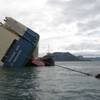Royal Caribbean Reports 2Q Results
Royal Caribbean Cruises Ltd. announced second quarter earnings were $66.7 million or $0.34 per share. This compares to $81.7 million or $0.42 per share for the second quarter of 2001. Net revenues per available passenger cruise day ("Yields") were down 3.3 percent, which was significantly better than previous guidance of a decline in the range of 5 to 7 percent. At June 30th, the company's net debt to capital
ratio was 56.6 percent and liquidity was approximately $1.6 billion.
Revenues for the quarter were $821.8 million, essentially unchanged from the same quarter prior year. The impact of an increase in capacity was
offset by the decrease in yields and a significant decline in the number of
guests purchasing air transportation from the company.
The company previously gave guidance that it expected total operating costs
(operating plus SG&A expenses) excluding fuel for the full year to drop 5 percent
on a per available berth day basis. The drop in the second quarter was in
fact significantly higher, at 13.2 percent. Contributing to this decline was
reduced air transportation costs associated with fewer passengers
purchasing air tickets from the company and lower commission costs
associated with lower ticket prices. Due to the anticipated return to more
normal air/sea levels and an increase in commissions as well as certain
timing issues, the company believes that the previous guidance continues to
be accurate.
In mid-June, Royal Caribbean International received the EFFIE award for its
"Get Out There" campaign. "The success of our marketing campaign is best
evidenced by the improvement in our sales," said Fain. "However, we are
gratified to also have received the recognition of an EFFIE, which is widely considered to be the top advertising effectiveness award within the
advertising and marketing industries. We hope to see similar results from the launch of the new Celebrity campaign later this month." As a result of the continued focus on sales and marketing efforts and the improvement in the yield environment, the company has decided to increase the budget for SG&A, and now anticipates full year expense to be between $430 and $440
million. This range represents a 13 to 14% drop in the company's comparable SG&A expense per available berth day from 2001.
During the quarter the company took delivery of Constellation, the last of the Celebrity newbuilds on order. The delivery of Constellation grows the
Celebrity fleet to a total of nine ships, which have an average age of
approximately 4 years. Celebrity's fleet was recently recognized by the
U.S. Coast Guard for its superior environmental operations with the 2002
William M. Benkert Award for Environmental Excellence.
In connection with the delivery of Constellation, the company utilized an
export financing facility, which has a floating rate of LIBOR plus 1.5% and
amortizes over eight and one half years. Brilliance of the Seas was
financed through a long-term operating lease. The term of the lease is 25
years and is cancelable in years 10 and 18. The effective interest rate of
the lease is approximately 5.75%.
Following delivery of Constellation, total debt as of June 30, 2002 was
$5.6 billion. Cash and cash equivalents were approximately $600 million as
of that date, and the company's $1 billion revolving credit facility was
fully undrawn, for liquidity of $1.6 billion. The company also has
available export financing facilities for approximately $600 million for
the deliveries of Serenade of the Seas and Jewel of the Seas.
The company has options for construction of two additional Radiance-class
ships for delivery in 2005 and 2006. In light of the uncertainty relating
to the proposed combination with P&O Princess, the company has extended the
expiration date on these options to September 20, 2002.
Based upon the company's current estimates of revenues and expenses, it
believes the consensus of analyst estimates for 2002 full year EPS to be
reasonable. Looking forward, the booking period for 2003 is just
beginning. This, coupled with the limited visibility resulting from the
current close-in booking environment, makes it difficult to provide
guidance for next year. However, if 2003 yields return to 2001 levels, the
company expects that it will meet or exceed current consensus for 2003 full
year results.
Separately, the company disclosed that it expects to incur approximately
$25 million in costs related to the proposed combination with P&O Princess.
If the transaction is completed as contemplated, these costs, together with
additional success fees, will be capitalized as part of the overall
transaction. In the event the combination does not occur, these costs will
appear as part of operating expenses in the quarter that the final
determination about the transaction is made.










